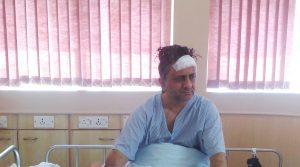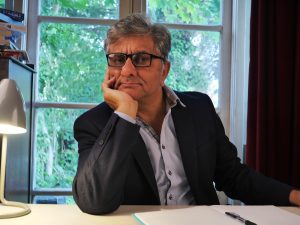Vic's story
Hello, I am Vic. I am married with two grown-up daughters, and work as a Mindfulness Training and Development Coach. On the night of 21 August 2009, at the age of fifty, I suffered a subarachnoid haemorrhage (SAH).
My wife and I, with our two daughters, aged seven and ten at the time, had travelled to India in July of that year, and had been there for a month. We were staying at my wife’s family home in the city of Ahmedabad, Gujarat.
It was late at night about 12:30, when I decided to do a little exercise before going to bed. I had just got down on the exercise mat, when I felt a sharp pain on the left side of my neck. This was unlike anything that I had previously suffered. I immediately stood up, rubbing my neck, and told my wife about it. She thought I might have pulled a muscle, and suggested that I take a couple of paracetamols. She also suggested that I should relax my mind by deep breathing. I replied to her that it was not a muscle pain or anxiety, that it was something else, and I felt that I should go to a hospital instead of relying on paracetamols.
My gut feeling said this time it was something serious.
But, we had no idea what to do – which hospital? How? Ambulance? Car? Who will look after the girls? By now, I was starting to feel disoriented, and felt my left leg going numb. I told my wife to knock on the neighbour’s door and ask them about hospitals. She ran to the neighbour’s door and started banging so loudly that I could hear from a distance. I then heard inaudible murmur. I had started to feel sick, and went limping into the bathroom. On entering the bathroom, I threw up. My thoughts about having something serious were now feeling real. I just wanted to get to the hospital.
We both lived in England, so had no idea of the hospitals or familiarity of how the system worked. We usually relied on my wife’s family for such information when travelling in India, but this time they were away attending someone’s funeral. Not a good time to disturb them.
A few friends managed to reach our place within minutes. Before they could come upstairs in the escalator, I walked down the stairs in my pyjama bottoms, shirtless, and was frantically looking to catch a taxi.
A friend called Sandeep rushed down. He asked me to sit in his car. Upon starting the car, Sandeep realised that the fuel indicator was showing low, nearly empty tank. So, to be on the safe side, he suggested that we take a tuk-tuk to the hospital as the driver would know the quickest route. I was now beginning to panic.
We were on our way to the hospital, with me sitting in the back, hanging on for dear life. After a few kilometres the driver turned into an alley hoping to take a shortcut but as luck would have it the alley was blocked by a truck, and instead of getting through he drove into the centre of a pack of sleeping stray dogs (that, on being startled from the slumber, jumped up, surrounded the vehicle, and started to viciously bark.) Door-less tuk-tuks, open on both sides, dogs reaching very close to my legs, snarling and barking. The driver instantly U-turned the tuk-tuk and headed back the way we came and out onto the main road in which we were now being chased by an aggressive pack of dogs. For a moment, they reminded me of a malnourished pack of huskies that instead of pulling were chasing us away. A sight to behold! I was fully exposed to the danger of being bitten, I had pain in my neck and head, and the numbness was now extending to the rest of my limbs – this was all taking precedence in my affrighted mind.
So, here I was, in the middle of the night, hurtling down an empty highway in Gujarat, India, half-naked, sat in the back of a tuk-tuk, en route to the hospital, to save my life.
We were speeding down the road with the barking snarling pack of dogs chasing us, and in some ways accompanying us, like some motorcycle outriders escorting a VIP.
We reached the hospital within a few minutes, not as a normal patient would arrive at a hospital in a beacon-flashing ambulance, but instead escorted by a pack of dogs. Due to the drivers haste to get way from the dogs, we reached sooner than anticipated. Karmic intervention, perhaps!
A friend called Venu was ready and waiting with a wheelchair for me and wheeled me in. I was again violently sick and taken into the reception area. Within a few minutes I was being attended to, put on drips, and stabilised. After going through the usual assessment and question, an MRI scan was done. Shortly afterwards the doctor came back with the results. When he told me about the result – a brain haemorrhage, caused by a ruptured aneurysm, the enormity of what I had suffered sank in, and how lucky I was to have made it to the hospital. All the adrenalin rush on the way might have helped.
I was admitted into the Sterling Hospital, Ahmedabad that night. The next morning, a team of doctors gathered around my bed to explain and discuss my situation. I was stabilised and sat up in bed, and in my nervous and confused state, enquired as to the best plan of action. I was told that the only option was an immediate invasive surgery to clip the aneurysm. I wanted to know whether I could fly back to the UK as I, erroneously, believed that I would not receive the quality of care that I would receive back in the UK. The doctors said that a long-haul flight was a very risky proposition, and that the decompression in the aircraft could be dangerous. They assured me that they will do their best to treat me, and that I would receive no less care than the one I would have received in the UK.
So, it was decided that the operation would be done that very evening. I prepared to go into surgery, my wife and family were understandably very worried about how this would turn out. I on the other hand had no fear, and was surprisingly in a state of calm, telling my wife that if I did not make it, then she should be brave and live a good life.
I went into the operation theatre around 6 PM. The operation (a craniotomy) was meant to last two to three hours. But when I did not come out until midnight, six hours into the surgery, my family began to get really worried.
Soon after midnight, the doctors emerged, as my wife explained to me later, and gave the good news to her that the operation was successful and that while they were operating they had discovered a second aneurysm behind the burst one, and one that had gone undetected on the CT Scan. So, they had to clip both of them. I remember being woken up by one of the consultants in a dazed state of consciousness, my head was bandaged and I was transferred to the Neuro-ICU ward. My family could meet me only the following morning.
I stayed in the hospital for about two weeks. I received world-class treatment, and I made a speedy recovery.
When my surgeon asked what the secret of my success was, I told him that it was the hospital food. He happily inquired if it was that good. I joked, “No, it was so bland that I just wanted to leave.”
On being discharged, I returned home, and was on put on a lot of medication, and remember not having any appetite. I had to force myself to eat, and was often very envious when I saw others eating and enjoying their food.
I had brief periods of memory loss and feeling low. But, nevertheless, when I could I forced myself to walk in our apartment from one end to the other to keep my spirits high and regain some fitness. I wanted to keep my mind positive and strong, as I felt that this would be crucial to my recovery.
Most of the time I felt like in a haze, lifeless and drowsy, and spent a lot of time sleeping – the effects of the medication.
At the beginning of November 2009, I returned to the UK. After looking at my records my consultant commented that he was very impressed with the operation, my recovery, and that the Indian doctors at Sterling hospital had done a great job.
The next few years were difficult. I experienced a lot of anxiety and stress, leading to panic attacks, and other symptoms, visiting the local A&E on many occasions, due to imaginary symptoms caused by my condition.
In order to take control of my mental and physical wellbeing, I decided to take up meditation. This is something that I had been meaning to do for a number of years.
This was the start of my transformation. I started to do TM meditation, then Mindfulness meditation and yoga. I made a full recovery. The stress and panic attacks stopped. I came off all medication.
What was even more remarkable was that I had since my teenage years suffered from regular headaches. These headaches completely stopped after my haemorrhage/operation. I have not had a single headache since.
I have now embraced a wellness lifestyle, and teach mindfulness meditation and have incorporated this in my daily life. I can honestly say that I am better than ever, and have no related problems.
I spend my time helping people improve their lives. I like to inspire and motivate people. Before my SAH, I used to be a very keen runner and would run five to seven miles many times a week, but after my operation I was advised to give it a while before resuming impact exercises. I now hope to resume my running again.
I consider myself to be very lucky, having been given this second chance in life, and have embraced life in a totally grateful way, and would like to share my experience with others, to help them in their lives.


Sharing your story helps drive positive change for people affected by neurological conditions. We like to share the experiences of real people who are using, fundraising or volunteering for our services to help raise awareness of neurological conditions.
There are many ways to share your story with us – in written format, as a video recording or an audio recording, we even have people share their story through artwork. It’s up to you which you most feel comfortable with.
To share your story, get in touch with us. We’d love to hear from you.